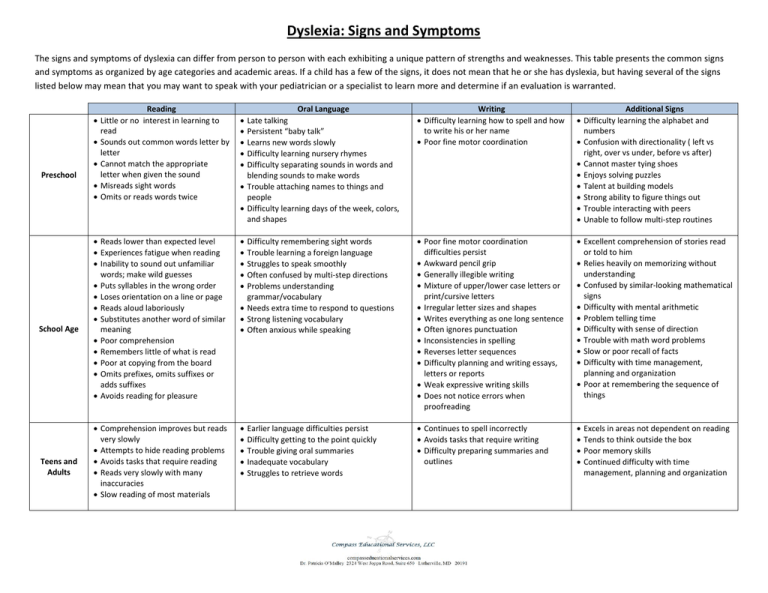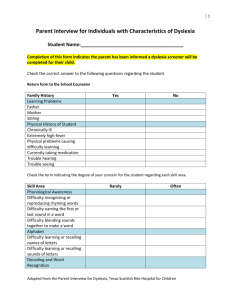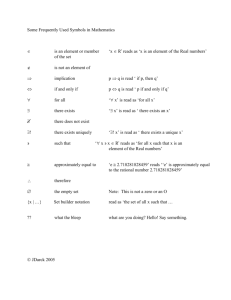Dyslexia: Signs and Symptoms - Compass Educational Services, LLC
advertisement

Dyslexia: Signs and Symptoms The signs and symptoms of dyslexia can differ from person to person with each exhibiting a unique pattern of strengths and weaknesses. This table presents the common signs and symptoms as organized by age categories and academic areas. If a child has a few of the signs, it does not mean that he or she has dyslexia, but having several of the signs listed below may mean that you may want to speak with your pediatrician or a specialist to learn more and determine if an evaluation is warranted. Preschool School Age Teens and Adults Reading Little or no interest in learning to read Sounds out common words letter by letter Cannot match the appropriate letter when given the sound Misreads sight words Omits or reads words twice Oral Language Late talking Persistent “baby talk” Learns new words slowly Difficulty learning nursery rhymes Difficulty separating sounds in words and blending sounds to make words Trouble attaching names to things and people Difficulty learning days of the week, colors, and shapes Writing Difficulty learning how to spell and how to write his or her name Poor fine motor coordination Additional Signs Difficulty learning the alphabet and numbers Confusion with directionality ( left vs right, over vs under, before vs after) Cannot master tying shoes Enjoys solving puzzles Talent at building models Strong ability to figure things out Trouble interacting with peers Unable to follow multi-step routines Reads lower than expected level Experiences fatigue when reading Inability to sound out unfamiliar words; make wild guesses Puts syllables in the wrong order Loses orientation on a line or page Reads aloud laboriously Substitutes another word of similar meaning Poor comprehension Remembers little of what is read Poor at copying from the board Omits prefixes, omits suffixes or adds suffixes Avoids reading for pleasure Difficulty remembering sight words Trouble learning a foreign language Struggles to speak smoothly Often confused by multi-step directions Problems understanding grammar/vocabulary Needs extra time to respond to questions Strong listening vocabulary Often anxious while speaking Poor fine motor coordination difficulties persist Awkward pencil grip Generally illegible writing Mixture of upper/lower case letters or print/cursive letters Irregular letter sizes and shapes Writes everything as one long sentence Often ignores punctuation Inconsistencies in spelling Reverses letter sequences Difficulty planning and writing essays, letters or reports Weak expressive writing skills Does not notice errors when proofreading Excellent comprehension of stories read or told to him Relies heavily on memorizing without understanding Confused by similar-looking mathematical signs Difficulty with mental arithmetic Problem telling time Difficulty with sense of direction Trouble with math word problems Slow or poor recall of facts Difficulty with time management, planning and organization Poor at remembering the sequence of things Comprehension improves but reads very slowly Attempts to hide reading problems Avoids tasks that require reading Reads very slowly with many inaccuracies Slow reading of most materials Continues to spell incorrectly Avoids tasks that require writing Difficulty preparing summaries and outlines Earlier language difficulties persist Difficulty getting to the point quickly Trouble giving oral summaries Inadequate vocabulary Struggles to retrieve words Excels in areas not dependent on reading Tends to think outside the box Poor memory skills Continued difficulty with time management, planning and organization


